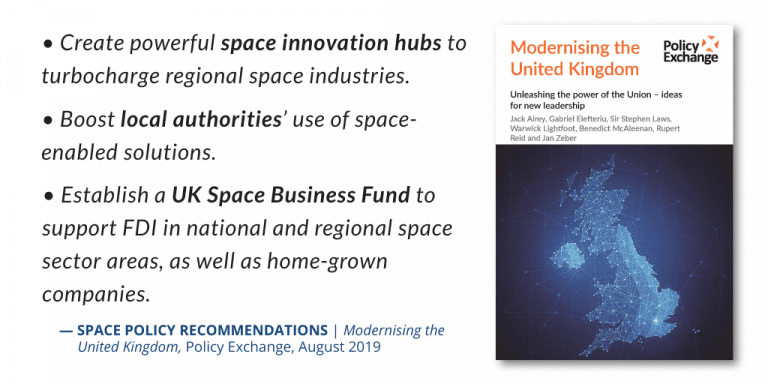
Gabriel Elefteriu
Director of Strategy and Space Policy
Countries like China, the US, France or India understand this, and have the financial resources and strategies in place to compete and secure their own space interests effectively. In this context, a lot is riding on the Government’s vision for lifting Britain up the space power rankings.
Britain has always been known as a “space laggard” amongst its peers: despite a world-class science base, it has been reluctant to invest in major national space capabilities except Skynet, the satellite constellation required for military communications and nuclear command and control.
As evidenced in a recent Defence Select Committee hearing (and to its Chair’s surprise), we spend less than Italy on space. So we have ended up well behind the curve in an era when great power competition and shifting alliances again place a premium on sovereign solutions.
A useful planning basis
This year has seen a major upgrade for UK space policy in official thinking: first through the Integrated Review (IR) which gave space unprecedented prominence; and now through the NSS. It is a solid document, and indeed a feat of bureaucratic coordination, given how many parts of government are involved – the NSS itself lists ten major departments and agencies – whose interests must be reconciled.
Nonetheless, the UK has now finally joined the club of countries with a comprehensive, civil-military integrated description of their space activities, main concepts, and general aspirations. Most of its contents will be familiar to those with an interest in space affairs, as it largely describes what the Government is already doing or repeats plans stated before, in other settings. But having it all put together in one place is invaluable to future planning both in government and in industry, so in a very real sense, the NSS’s greatest merit is the fact that it now exists as an official document.
The strategy offers a well-articulated concept of growing the UK space sector’s competitiveness through careful interventions, cross-government integration and regulatory support. (It is also a reminder to devolved administrations that their own space successes are inextricably linked to national UK policy.) Added to this, diplomatic initiatives and defence inputs are set to help shape international space rules and deliver security for the UK space enterprise. And the totemic national “science & technology” focus announced in the IR would drive the NSS too – an indication that the UK’s space future is de facto in the hands of scientists not necessarily strategists.
In any case, the sense of a country at the forefront of space affairs is strengthened by NSS mentions of areas like human spaceflight (a major opportunity for the UK, given our domestic strengths including in space medicine, for example), space control, in-orbit servicing and manufacturing – and by plans to lead on space sustainability and on using space data to support public services.
There is a clear intent, therefore, to build on the UK’s increasingly sophisticated “end-to-end” space-economic model, where entrepreneurs can take a space project from idea to orbit and easily find support at every step of the way.
What ambition?
Less clear, however, is the real ambition behind this strategy, eye-catching rhetoric aside. The Government’s only concrete, measurable space policy target – capturing 10% of the global space economy by 2030 – has now been scrapped. This comes as the UK’s space growth rate has gone in reverse and our share of the global space economy has effectively stagnated in recent years – a reminder of how tough the competition is. We are still growing, but others are doing even better and going further.
Replacing the decade-old 10% target are a number of aspirations whose actual meaning – either in absolute or in relative terms – is hard to pin down. There is a commitment, for example, to turn the UK into a “meaningful space actor” and to build “one of the most innovative and attractive space economies in the world”. None of this, however, includes any sense of proportion: both these goals can be met at a relatively small scale or in niche ways, when set against the global context.
How “big” does the UK actually want to be, in the space domain of the future? We are used to comparing our military, economic, diplomatic and – as the IR sets out – even our cyber power against our peers. There are relatively clear expectations about where Britain should stand globally in these and other domains of national power. Not yet so in space, and this is arguably due to the novelty of space strategy-making in government.
Room for improvement
For all the NSS’s real strengths, there are a number of key questions on which its next iteration or future policy actions can improve. First and foremost, as Policy Exchange has argued in the past, there is a need for a clearly defined, clearly resourced National Space Programme to run in parallel to our ESA investments – beyond the NSIP (National Space Innovation Programme, worth £15m last year) and the MOD’s space portfolio. The UK needs a long-term space technology roadmap that takes us to a more clearly defined end-state as a space power; this is the backbone of any successful space policy anywhere.
A UK National Space Programme may yet materialise following the Comprehensive Spending Review and the CSR settlement for space would have to be a real game-changer, given the expectations raised by the NSS. To put things into perspective: according to The Space Report 2020 (Q2), in 2019 non-Defence, non-ESA space spending in France, Germany and Italy was €1.04 billion, €1.344 billion and €336 million respectively.
Secondly, the question of how the UK can protect its long-term interests in ESA – especially value for money – is becoming increasingly urgent, but is almost completely avoided in public debates, let alone official documents. On the contrary, the NSS – as well as the new Minister in his public statements – gives a sense of “business as usual” and indeed presses for “stronger” relations with Europe on space.
More critical analysis is required here: not only because of the EU’s strong political influence on ESA, with a clear risk of Brexit-related security exclusions being used to squeeze the UK out of key parts of the most interesting and lucrative EU-owned, ESA-delivered programmes; but also because it runs against UK’s wider shift in its strategic posture as described in the IR.
In other words, the space component of Global Britain needs to come into increasing alignment with the Indo-Pacific/AUKUS tilt. And the civil-military space “integration”, as championed by the NSS itself, should entail a space-industrial pivot towards the US, given the Special Relationship which is defence-driven and considering the MOD’s leading role in UK space (underlined by the fact Defence is set to publish its own separate space strategy).
A third major topic to address in the future is UK space governance, which is a strategic matter of the first order but sometimes driven by internal Whitehall concerns. The cross-government space policy-making apparatus is exceedingly complex: institutional reform is badly needed, with stronger and more authoritative direction from the centre, ideally under a dedicated Space Minister. Additionally, to achieve space power status the UK will need a proper space R&D and delivery capability in government similar conceptually to France’s Toulouse Space Centre or NASA’s labs.
But first the Government has to be persuaded that despite cutting across so many other policy areas, space is a strategic domain in its own right with far-reaching consequences for the national interest. It requires coherent, top-level focus which means that the current approach of integrating policy inputs from different departments should evolve towards unification. Britain’s light-touch space policy model, too, should progress towards a more hands-on version – but that in turn must probably await the build-up of more expertise, strategic vision, political support in Parliament and, crucially, more funding.
Hope for the future
Ultimately, the NSS is a welcome business development plan for the space sector, a major and very useful step forward in terms of government focus and approach to this critical area. Crucially, at long last it gives the industry and the wider space community a concrete point of reference for future planning.
But the money and the substantive decisions on programmes as well as on the deeper questions around space governance and capacity-building – all key to “boosting” British space – are still in the future. This will likely be a holding document to be followed by more strategically-advanced policy-making going forward – and, crucially, by a Spending Review settlement that would put real money behind some of the fine, clever language. But the “launchpad” is now ready.
Gabriel Elefteriu FRAeS is Director of Research & Strategy and Head of Space Policy at Policy Exchange


